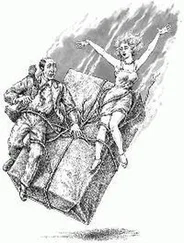“It sounds good, Etta.”
“Just because a house is haunted is no reason to move out of it,” she said. “The hell, it’s less lonely that way.”
Later that day he felt vaguely dissatisfied and wondered why. It seemed illogical that he should be bothered at deceiving Roberta; the deception was harmless enough, and was designed to help put her mind at ease.
Perhaps it was the story Etta Jellin had told. It was preposterous that such a solid earthy woman could actually believe in haunted houses, and her belief became all the more convincing for her general air of no-nonsense earthiness.
Grace Molineaux took a pillow
And planted her kids beneath a willow.
Not terribly good, he thought. Willow was all too obviously there just to rhyme with pillow. The bit about Lizzie Borden might also be doggerel, but at least it was good doggerel.
Grace took a pillow and gave a shove
And smothered her kids with mother’s love
That was better. A shame he couldn’t share it with Roberta, but if one thing was certain it was that he could not say Word One to Roberta about Grace Molineaux and her claim to infamy.
Not that he felt there was more than a chance in a hundred that the woman had actually lived in their house. Of course it was possible, just as it was possible that Grace herself was the subject of the portrait Ariel seemed to be so fond of. Under normal circumstances that was the sort of thing Roberta would have enjoyed believing.
But circumstances had not been normal for quite some time now.
No, this was something he couldn’t possibly risk mentioning to Roberta.
When Ariel got out of bed that morning her night table was centered under the portrait of the woman with the rose. Its top was empty except for the jar lid. The candle stub had burned down to less than half an inch. A burnt match lay in a pool of congealed wax at the side of the candle.
She moved quickly, putting the candle away, returning her table to its usual position, replacing her clock and lamp on top of it. Then, hesitantly, she looked up at the portrait.
Evidently she had awakened in the middle of the night to go through the candle ritual again. But she couldn’t remember any of it. As far as she could recall, she hadn’t even dreamed during the night. The last thing she recalled was lying in bed on the verge of sleep.
Maybe she had gotten up in the middle of the night to go to the bathroom. Sometimes that happened and she’d go and come back and be half asleep, barely able to remember it the next day.
But this was different, wasn’t it? Whatever woke her, whatever got her out of bed, she’d evidently gone through a whole ritual with the candle, moving furniture and lighting a match and doing God-knew-what while the candle burned. She looked at the portrait again, trying to learn something from the woman’s compelling gaze, but it didn’t help. Her memory was blank and it frightened her.
Was that all she had done? Just light a candle and go through some mental hocus-pocus number?
Or had she left her room?
She dressed and left it now, walking directly to the bathroom, hurrying past the closed door of Caleb’s room. She washed up, brushed her teeth, used the toilet. In the hallway, she cocked her head and listened. David and Roberta were both downstairs.
She walked to Caleb’s door, stood outside it for a moment. Her hand settled on the doorknob, hesitated. She turned the knob, drew a breath, opened the door.
The room was untouched. Everything was as it had been when Roberta last straightened it. Caleb’s fish mobile remained in place over the crib.
Relief. Whatever weirdness she’d been a part of last night, at least she hadn’t done a number on Caleb’s room.
She closed Caleb’s door and went downstairs for her breakfast.
While Jeff Channing had known Etta Jellin for years, it never occurred to him to turn to the realtor for information about previous occupants of the red-brick house on Legare Street. Instead he did what his legal training had taught him to do, searching the house’s title. He’d done this sort of thing any number of times in connection with real estate transactions, and there was no particular difficulty now in tracing the ownership of the house down through the years since it was built in 1822 by a Colonel Joseph Warren Clay.
The house had changed hands half a dozen times during the nineteenth century. A man named James Petersmith had bought it in 1903. His children had sold shortly after the 1929 stock market crash, and since then the house had never remained in the hands of a single owner for longer than seven years. Several owners had bought and sold the place within periods of less than a year.
A curious history, he thought. Americans were a mobile lot, certainly, especially since World War Two. He recalled reading somewhere that twenty percent of the nation’s families pulled up roots and moved every year. But homes in Old Charleston didn’t tend to turn over quickly. The sort of people who were attracted to them tended to stay put for a while.
Maybe there was something about the house, something vaguely disquieting that made its occupants sufficiently uncomfortable to sell and move on. The Traphagens, who had sold to the Jardells, had been transferred to another location, and no doubt other residents had had similarly sound reasons for moving. But it seemed a fair assumption that at least a few of the house’s recent owners had been made uneasy by the night sounds and had shrunk from the damp. Perhaps they’d seen things in the corners of the bedrooms too. Perhaps their noses had wrinkled at the smell of gas when the stove’s pilot lights had refused to stay lit. After a while people could weary of rationalizing the peculiar and just get out... unless, like himself, a person was concerned about one of them and was drawn in, out of curiosity and concern, to probe further, regardless of realistic skepticism... in spite of it...
Odd, too, that no one had even gotten around to replacing the old gas range. Odd, for that matter, that so many owners had made so few changes in the old house.
Odder still that the portrait had lain unnoticed for years until Ariel came on it. You would have thought some previous owner would have cleaned out the attic.
By the time he left the Deeds Registry, Jeff had covered a sheet of paper with names running all the way back from Traphagen, Carl and Julia, to Clay, Colonel Joseph Warren. He scanned the list, unsure that it represented anything beyond busywork. The subject of the portrait in Ariel’s room might be on the list, and if so hers was very likely one of the first six or eight names on it. But it seemed even more likely to him that some recent tenant had picked up the portrait at an auction or garage sale, then stowed it in the attic and forgot it at moving time. The painting needn’t have anything to do with Bobbie’s house; indeed the woman it depicted might well never have been within five hundred miles of Charleston in her life.
Fool’s business, he thought. And it wasn’t as if he didn’t have anything better to do. He’d been letting his work slide shamefully lately, staying away from the office for long stretches every day and finding himself incapable of concentrating during those rare hours that he did spend at his desk. The informal title search he’d just conducted was the first genuine legal work he’d done in far too long.
It was, no question, getting to him and he didn’t know just what to do about it. His inability to work was just a symptom, and not the worst of the lot. His mind was acting strangely, hurling uncomfortable thoughts at him, leaving him anxious and jumpy inside however calm the exterior he managed to present to the world. His perceptions were askew, his judgment unreliable.
Читать дальше







